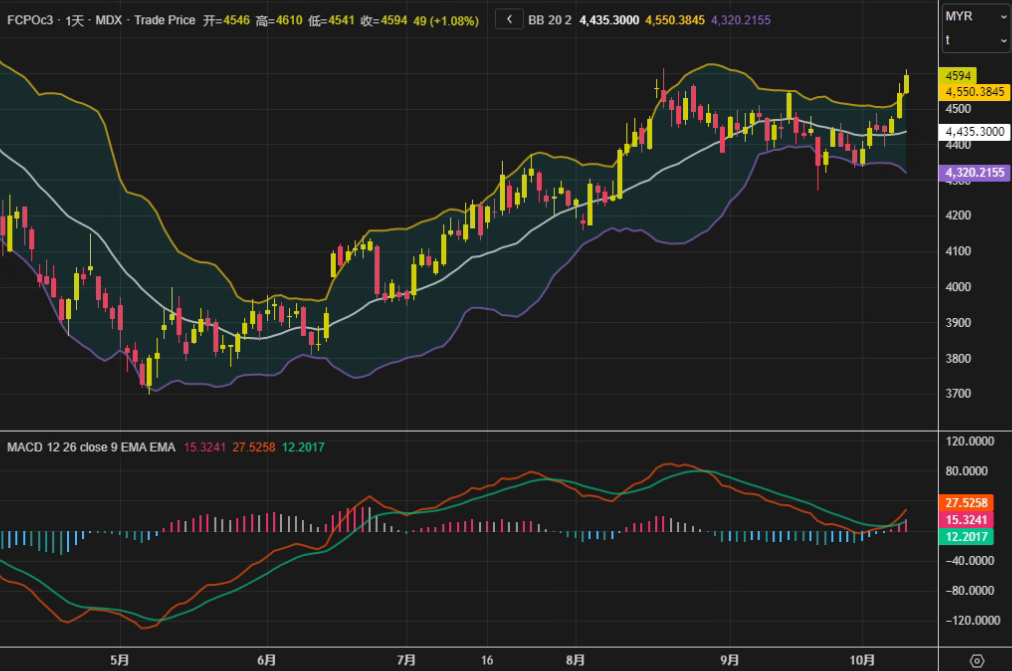Palm oil market sees strong breakthrough, Indonesian biodiesel policy and continuous oil prices push up prices
2025-10-09 19:10:29

Policies and demand resonate, and fundamental support is strengthened
The core driver of this rally stems from the Indonesian government's clear commitment to advancing its B50 biodiesel blending plan. The country plans to mandate a 50% palm oil-based biofuel diesel standard by 2026, aiming to reduce its reliance on diesel imports. If implemented, this policy will significantly boost long-term industrial demand for palm oil. Meanwhile, China's Dalian Commodity Exchange saw a strong post-holiday opening, with the main soybean oil contract surging 2.69% and the palm oil contract surging 4.13%, providing direct support to the Malaysian market. Notably, the return of capital and inventory replenishment following the October 1-8 National Day holiday in the Chinese market further amplified price elasticity.
Short-term concerns emerge, and the market faces a stress test
Despite the positive trend, some analysts remain cautious about a continued surge. Paramalingam Supramaniam, director of Selangor-based brokerage firm Pelindung Bestari, noted, "The market has initially priced in favorable Indonesian policies, but the rally is shaky in the absence of new catalysts. Traders may be closing positions for risk aversion ahead of the release of the Malaysian Palm Oil Board's (MPOB) monthly report. However, current high prices are already dampening demand, potentially creating a short-term headwind." This view highlights a real contradiction facing the market: policy expectations are driving a surge in financial assets, but a slowdown in spot purchasing may limit upside potential.
External market competition intensifies, and volatility risks rise
The complex landscape of the crude oil market presents uncertainties for palm oil. While the Gaza ceasefire agreement has eased geopolitical risks, the deadlock in Ukrainian peace talks has led to the continuation of sanctions on Russian exports, creating a volatile tug-of-war between international oil prices. Palm oil's competitiveness as a biodiesel feedstock is highly correlated with crude oil prices. Continued pressure on crude oil prices will weaken palm oil's energy alternative advantages. Furthermore, the stable ringgit exchange rate against the US dollar has not significantly impacted exports.
Institutional perspectives focus on policy implementation and data verification
Reputable institutions monitor the market, indicating current technical indicators are showing signs of overbought conditions. The upper Bollinger Band (20,2) has reached 4550 points, and the MACD golden cross continues, but with narrowing red bars, suggesting fading upward momentum. Market attention is turning to the upcoming MPOB data. If inventory declines fall short of expectations or export data weakens, profit-taking could be triggered. Paramalingam Supramaniam emphasized, "The policy narrative needs to be supported by actual consumption. If the B50 implementation lags or the Dalian oil and fat rally falters, the current premium will face correction pressure."
Outlook: Rebalancing policy expectations and actual needs
Palm oil's short-term strength stems from its resonating financial and commodity attributes, but its medium- to long-term outlook hinges on two key factors: the specific timetable and implementation of Indonesia's B50 policy, and whether Chinese import demand can keep pace with current prices. While analysts remain optimistic about future prices, caution is warranted if future data fails to meet expectations, prompting a technical correction. The market will seek a new balance between policy aspirations and real-world validation.

- Risk Warning and Disclaimer
- The market involves risk, and trading may not be suitable for all investors. This article is for reference only and does not constitute personal investment advice, nor does it take into account certain users’ specific investment objectives, financial situation, or other needs. Any investment decisions made based on this information are at your own risk.





















